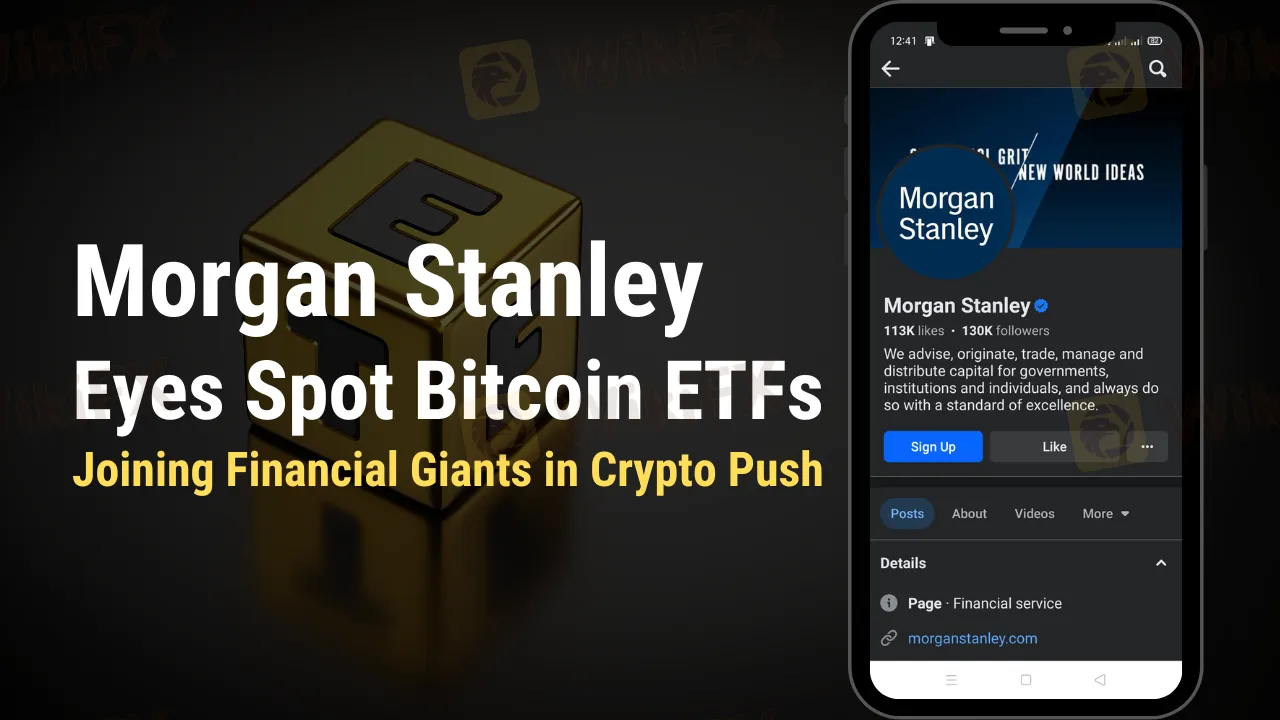简体中文
繁體中文
English
Pусский
日本語
ภาษาไทย
Tiếng Việt
Bahasa Indonesia
Español
हिन्दी
Filippiiniläinen
Français
Deutsch
Português
Türkçe
한국어
العربية
Morgan Stanley Eyes Spot Bitcoin ETFs, Joining Financial Giants in Crypto Push
Abstract:Morgan Stanley to add Bitcoin ETFs to its platform, signaling a shift in traditional finance towards embracing cryptocurrency investments and market expansion.

Morgan Stanley is planning to integrate spot Bitcoin ETF (exchange-traded fund) products into its brokerage platform, after the SEC's approval of this investment vehicle in January. This signifies a momentous achievement. This ruling potentially signifies a growing inclination among traditional financial institutions to consider Bitcoin investments.
Ten spot bitcoin ETFs are available in the US. GBTC by Grayscale, IBIT by BlackRock, and FBTC by Fidelity are the most asset-weighted. Investors might expect Bitcoin ETFs to simplify investing. Investors may buy Bitcoin ETFs instead of the cryptocurrency.
After its 2021 determination to grant high-net-worth clients access to Bitcoin funds, Morgan Stanley, a prominent organization in alternative investments and private markets with a management portfolio exceeding $150 billion, has taken this action. Principal U.S. institutions took this as an innovative first. The bank confirmed on its first-quarter results call that it has made Bitcoin investments, highlighting outside cryptocurrency funds like Galaxy Digital and NYDIG.

As a sector less susceptible to capital market fluctuations and distinguished by more consistent revenue sources, wealth management aligns with Morgan Stanley's strategic emphasis and entry into bitcoin exchange-traded funds (ETFs). It has acquired Shareworks, Eaton Vance, and E*Trade Financial, as further evidence of this strategic direction. Client assets at the bank's wealth management department grew 17.4% from 2018 to 2023, which is remarkable.
Additionally, Wall Street behemoth Goldman Sachs has been discussing becoming an authorized participant (AP) in BlackRock and Grayscale's spot bitcoin ETFs. Accountants are critical components of the exchange-traded fund (ETF) sector, as their responsibility is to set up and redeem ETF shares in a manner that closely corresponds to their underlying assets. Potential participation by Goldman Sachs would unite it with other financial behemoths such as Jane Street, Cantor Fitzgerald, and JPMorgan Chase, which are already APs for numerous bitcoin ETFs.
J.P. Morgan, Jane Street, a quantity trading business, and BlackRock, the biggest asset management company in the world, have partnered to create the bitcoin exchange-traded fund (ETF). Another ETF candidate, Valkyrie, has also chosen Jane Street and Cantor Fitzgerald as APs. These connections are crucial because it is against the law for these asset managers to buy cryptocurrencies directly. Instead, they provide APs with control over the process.
The introduction of Bitcoin ETFs should encourage Bitcoin investors. Economic Vehicle Trusts (ETFs) simplify bitcoin investing by eliminating direct acquisitions. Due to this breakthrough, Wells Fargo, Merrill Lynch, and Morgan Stanley expect significant increases in investments in these products.

Many traditional financial organizations are incorporating cryptocurrency into their products. Morgan Stanley's Bitcoin ETF portfolio reflects this. By merging innovative investment prospects with traditional financial frameworks, this integration enables mainstream investors to more easily penetrate the cryptocurrency market.
The expansion of the cryptocurrency market and the rising interest of traditional financial institutions highlight the sector's growing legitimacy and potential. These establishments potentially appeal to a wider spectrum of investors as they engage in cryptocurrency investments, thereby enhancing their transparency and reliability.
At the intersection of traditional finance and cryptocurrencies, Morgan Stanley's proposed inclusion of spot bitcoin ETFs on its platform represents, in summary, a momentous development. This signifies an increasing recognition of digital currencies among established investment communities and suggests that cryptocurrencies may assume a more significant position in investment portfolios in the future. Combining the cutting-edge realm of cryptocurrencies with well-established investment methodologies, this action, in conjunction with comparable endeavors undertaken by other prominent financial institutions, signifies a significant transformation in the financial domain.

Disclaimer:
The views in this article only represent the author's personal views, and do not constitute investment advice on this platform. This platform does not guarantee the accuracy, completeness and timeliness of the information in the article, and will not be liable for any loss caused by the use of or reliance on the information in the article.
Read more

Nonfarm Data Lifts Market Sentiment, U.S. Stocks Rebound Strongly
U.S. nonfarm payrolls for May slightly exceeded expectations, stabilizing investor sentiment and easing fears of a hard landing. This upbeat data sent U.S. equities broadly higher, led by tech stocks, with the Dow and S&P 500 posting significant gains. However, behind the optimism lies a fresh round of market debate over the Federal Reserve’s rate path, with uncertainty around inflation and interest rates remaining a key risk ahead.

OctaFX Flagged by Malaysian Authorities
OctaFX has been officially listed on warning lists by both Bank Negara Malaysia (BNM) and the Securities Commission Malaysia (SC). These alerts raise serious concerns about the broker’s status and whether it is legally allowed to operate in Malaysia.

TradingPRO: A Closer Look at Its Licences
In an industry where safety and transparency are essential, the regulatory status of online brokers has never been more important. For traders seeking to protect their capital, ensuring that a platform operates under recognised and stringent oversight can make all the difference. Keep reading to learn more about TradingPRO and its licenses.

Oil Price Breakout Incoming? Investors Should Stay Alert
Oil prices are hovering around a critical level, with potential yet to be fully unleashed. Investors must prepare for sudden changes.
WikiFX Broker
Latest News
SkyLine Guide 2025 Malaysia: 100 Esteemed Judges Successfully Assembled
Vantage Markets Review 2025: Trusted Forex and CFD Trading Since 2009
TradingPRO: A Closer Look at Its Licences
The world could be facing another ‘China shock,’ but it comes with a silver-lining
A Guide to Intraday Forex Trading You Can't Miss Out
CONSOB Blocks Access to 13 Unauthorized Investment Websites
Why STARTRADER Is Popular Among Traders?
New SEBI Regulations on Intraday Trading
Everything You need to know about Barath Trade
OctaFX Flagged by Malaysian Authorities
Currency Calculator


